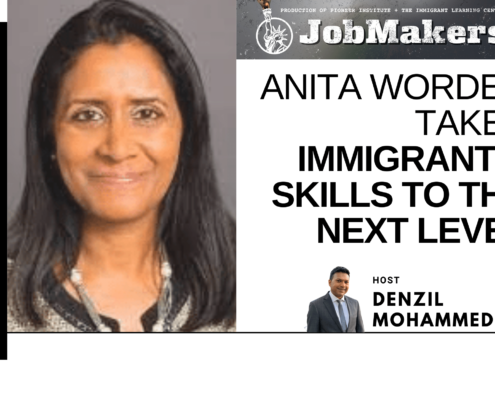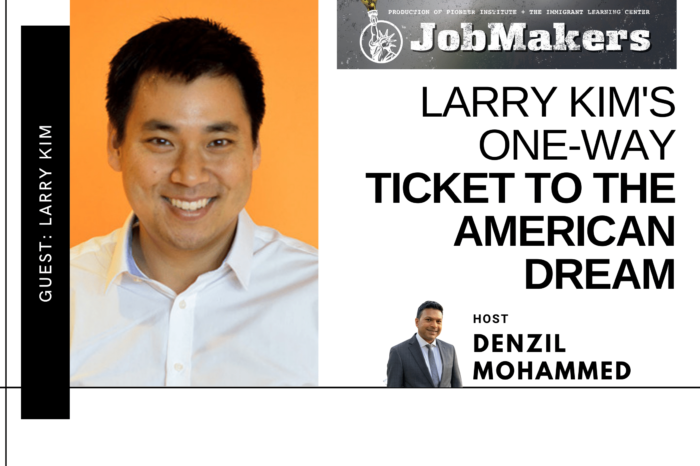Larry Kim’s One-Way Ticket to the American Dream
/in Economic Opportunity, Featured, JobMakers /by Editorial Staff
This week on JobMakers, host Denzil Mohammed talks with Larry Kim, founder of WordStream in Boston, which was acquired for $150 million, and MobileMonkey, a chatbot marketing platform for marketing and customer support on Facebook Messenger, web chat and SMS. Larry’s parents fled to Canada after the Korean War on a one-way ticket. That in turn gave him the opportunity to purchase his own one-way ticket to the U.S. to fulfill his American dream. Larry is creating hundreds of meaningful jobs for Americans (an estimated 1,800 from just his first company), something he’s not only proud of but feels is at the core of his values, to give back to the country that gave him the opportunity to actualize bold new ideas. Through his technology, he’s helped tens of thousands of companies to grow their businesses, and, with nearly 750,000 followers on Medium.com, he mentors budding entrepreneurs from around the world, as you’ll discover in this week’s JobMakers.
Guest:
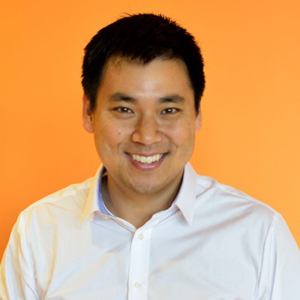 Larry Kim is the founder and VP of Marketing of MobileMonkey, the world’s best chatbot marketing platform for marketing and customer support on Facebook Messenger, Web Chat, and SMS. He’s been named Search Marketer of the Year from PPC Hero (2013, 2014, 2015, and 2017), Search Engine Land, and the US Search Awards. He also won special recognition from the United States Senate & House of Representatives for his work in creating jobs in the Boston economy. Larry is ranked the #8 most popular author on Medium. Larry is also the founder and former CTO of WordStream, Inc., the leading provider of AdWords, Facebook and keyword tools used by over a million marketers worldwide. The company employs more than three hundred people and manages billions of dollars of ad spend on behalf of tens of thousands of customers. WordStream was acquired by Gannett, parent company of USA Today, for $150 million in July 2018. Larry speaks at conferences across the country and internationally each year, including Dreamforce, INBOUND, Pubcon, SMX, SearchLove, Social Media Marketing World, and hundreds of others. Larry holds a degree in Electrical Engineering from the University of Waterloo.
Larry Kim is the founder and VP of Marketing of MobileMonkey, the world’s best chatbot marketing platform for marketing and customer support on Facebook Messenger, Web Chat, and SMS. He’s been named Search Marketer of the Year from PPC Hero (2013, 2014, 2015, and 2017), Search Engine Land, and the US Search Awards. He also won special recognition from the United States Senate & House of Representatives for his work in creating jobs in the Boston economy. Larry is ranked the #8 most popular author on Medium. Larry is also the founder and former CTO of WordStream, Inc., the leading provider of AdWords, Facebook and keyword tools used by over a million marketers worldwide. The company employs more than three hundred people and manages billions of dollars of ad spend on behalf of tens of thousands of customers. WordStream was acquired by Gannett, parent company of USA Today, for $150 million in July 2018. Larry speaks at conferences across the country and internationally each year, including Dreamforce, INBOUND, Pubcon, SMX, SearchLove, Social Media Marketing World, and hundreds of others. Larry holds a degree in Electrical Engineering from the University of Waterloo.
Get new episodes of JobMakers in your inbox!
Read a Transcript of this Episode
Please excuse typos.
Denzil Mohammed:
I’m Denzil Mohammed, and this is JobMakers.
Denzil Mohammed:
One way ticket. That’s migrating what you do when you get there is up to you because you’ve left your family and other supports behind. That’s an immigrant for Larry Kim founder of WordStream in Boston, which was acquired for $150 million and MobileMonkey chat bot marketing platform from market and customer support on Facebook messenger, web chat and SMS. That journey began when his parents fled to Canada after the Korean war on a one way ticket that in turn gave him the opportunity to purchase his own one way ticket to the U S to fulfill his American dream. Larry is creating hundreds of meaningful jobs for Americans. Something he’s not only proud of, but feels is at the core of his values to give back to the country that gave him the opportunity to actualize bold new ideas. He doesn’t even believe in patterns instead publishing textbooks on software development to foster the freedom for everyone to innovate through his technology. He’s helped tens of thousands of companies to grow their businesses. And with nearly 750,000 followers on medium.com, he mentors budding entrepreneurs from around the world. As you’ll discover in this week’s job. Larry Kim, thank you for joining us in job makers. How are you
Larry Kim:
Doing great, Denzil, how are you?
Denzil Mohammed:
I am excellent. And I’m so glad we got to talk to you. You’re such a tremendous business owner and entrepreneur, a social media Maverick. I remember back in 2019, when I met you, you were like two spots behind Hillary Clinton on the top writers on medium.com. Remember that?
Larry Kim:
Oh yeah, she hasn’t been blogging for a while, so I’ve actually passed her.
Denzil Mohammed:
So we met in 2019 at the eighth annual Barry M Portnoy immigrant entrepreneur awards, where you will award the winner in the high-tech business category by the immigrant learning center. And you said this is the most meaningful honor of my entire professional career. What did you mean by that?
Larry Kim:
Oh, sure. So Denzil, when you’re like a entrepreneur or just any careerist, you’re going to get all sorts of crazy awards. You know, some of them are pretty superficial, like, I don’t know, having lots of people to follow on social media or, or, or, or, or he’s constantly or, or growth awards, like you know, these Inc 5,000 fastest growing companies in America, but, you know, you know, of course it’s, it’s great to get any of these awards, but it’s important to understand that, well, my, my perspective on this is that the growth of the number of followers or whatever these other other awards are based on, like, that’s a means to an end that the, the true goal here is, is to create something of value and, and ultimately create jobs and employment for people in the community so that they can better their lives and you know, contribute back just as productive members of society. And so is that, and I kind of view your industry or your entrepreneurship board as kind of being the only word I’ve ever won. That kind of reflects, you know, my core, core belief system. And so that’s why I declared that this was the most meaningful or that I’ve ever been considered for and won in, in my career. And so it’s, it’s just an honor honor, and a privilege,
Denzil Mohammed:
You see your core beliefs, what, what did that word get at for you? What did it speak to,
Larry Kim:
Why is it that entrepreneurs do what they do? You know, why is it the film? Many of them are immigrants. And I think part of that is a life calling you know, to, to provide to help people to realize their full potential in life, by providing them a framework to be gain, you know, valuable skills, get paid for it and, and, and and advance their careers. And, and it’s just, that is my calling in life. And, and you know, just the structure, if I want you to do this is by creating these products and companies and, and, and, and selling products. But, but that is the, the a means to an end, that is the sort of the, you know, kind of what, what you see. But, but not the core motivating factor,
Denzil Mohammed:
Creating meaningful work allowing people to advance in their careers.
Larry Kim:
It’s strictly for their families, you know live the American dream, know there’s over a thousand people in the last decade. You know, and we don’t just hire, you know, we don’t just people who already had jobs and, you know, they were already flying high. No, we, we, we look for these people like one or two out of college, or in some cases, community college, or no college at all. And, and we train them, we train them how to sell things. We train them how to be a customer support rep like, and this is like, you know like we, we take people from companies like best buy, like full four, four salespeople, like really blue collar work. And I think we’re helping people refine their skills and, and just become even more productive members of society.
Denzil Mohammed:
Well said along people to live, live out their American dream. I want to get into your immigrant story and it didn’t just start with you, right. It started with your family.
Larry Kim:
Oh, sure. Yes. So about 20 years ago, I, I immigrated to the United States from the far, far away country of Canada. It was a 45 minute flight from the Toronto airport. It was a one way ticket and and I just, I just went here following my last exam from college and starting at a local startup here. And you know, you might say, well, let’s not you know, Canada’s like the 50 hours, something like, this is not really you know, a bit of a journey, but you gotta just, if you, if you take a step back, you think of the, the bigger picture of like, my parents started this journey you know, back 40, 50 years ago they were just children, young children in the, like during the Korean war in the, in the fifties.
Larry Kim:
And you know, there were just refugees, like, you know, walking hundreds of miles to avoid these conflict zones and carrying everything that they owned in like a bag on their back and like eating grass and drinking out of rivers to survive. And, you know, it was a pretty difficult environment and they, when they got a little older, they decided to, to move to there, to immigrate to Canada. It’s we’ve been in the like sixties and seventies. And yeah, they, they, they also booked a one way ticket here with like $20 in their pocket, something like that. So yeah, it’s just I think you, it’s just a continuation of that, that desire to want to provide something for, for your, for your life, for your family, for your community. And you know, the, this was a sort of like the, the last thought
Denzil Mohammed:
That’s just absolutely fascinating. So many Americans don’t know about these experiences that are in the backgrounds of immigrants today and refugees today. I’m glad that they made that move. It allowed you to be able to thrive and, and do better than they ever possibly imagined. You would have free. For instance, you were growing up in a, in a war torn country your journey as an entrepreneur, did you always know that you wanted to start a business and, and just correct me if I’m wrong, you degrees in electrical engineering. Right. And now you’re in digital marketing.
Larry Kim:
So, so absolutely. It was obvious that I wanted to create a business from the very beginning. Like my, you know, early jobs were like doing paperwork and building little recycling businesses, like in, in, in junior high and in high school. And you know, it was a situation where I knew I wanted to, oh, and my parents, my parents, my mother was an entrepreneur too. She was a piano teacher. So she, she basically taught me everything about marketing, like how to get finance, how to get students. And like, you know, don’t be the lowest Pentecost kennel teacher. Cause then you’re going to go all the worst students. Like you have to charge a little bit more than, than everyone else, like substitute teach me all of these lessons about but you know how to run a business. That’s another thing about entrepreneurship.
Larry Kim:
There’s usually some family influence, like from an, from a young age where someone is kind of teaching you the difference between an employee versus an employer. But, but but yeah I think yes, I absolutely want it to be this, you know, having a company or a business. It was just a situation where I didn’t have the skills or the idea of what to, what to do, like finding that niche, finding the need in the marketplace to fill. And so you know, like a lot of, a lot of people, you, you just start off in a regular job and, and you learn your skills. And then ultimately initially when I moved to Cambridge, it was to work for a marketing software company called layer which was later bought up by my Macromedia. And because that was marketing software, I learned a lot about digital marketing.
Larry Kim:
And so that’s where I was able to then identify kind of some needs of the marketplace around search advertising and social media advertising in terms of like products that you could build in terms of being an engineer, entrepreneur, I think that’s totally normal engineering of horses, a applied science. So it’s a piece of press as opposed to a kind of a pure scientific endeavor. And so you always have to take your engineering skills and apply it to some other area. So it’s like you know, biotech or, or a FinTech or marketing software,
Denzil Mohammed:
Like in the early stages going out there asking for money, developing your ideas, finding partners.
Larry Kim:
I mean, it’s, it’s kinda comical. Like I was like this 20 something you know, little lot ideas and just no, no contact, not a lot of experience. And I, I just did cold emailing, calling Coleen yelling. Like if you go to a venture website it’ll say like, do you want to partner with, there’s actually an alias on these, on these less, like, this is like, you know, like inquiries at venture company dot. So, so that you, you know, that’s not the most ideal way to go about pitching. Ideally you get some kind of recommendation or introduction, warm introduction, introduction from a portfolio CEO or something like that. But, but yeah, just the cold emailing and sure enough surprisingly we got a few dozen, a few dozen inquiries and that led to meetings and, and you know it didn’t, it didn’t happen overnight, but over a few years of like getting rejected and trying again you know, w was, it was able to both build, build a business that was fundable and finding world-class investors to, to back the idea,
Denzil Mohammed:
Describe Mobil multitask. What, what is it, what does it do? Why is it important?
Larry Kim:
The text messaging platform? You know, it’s, it’s a very, very important mode of communication if you’re a business doing you know, business to consumer marketing. So like if you’re a realtor, you know, you’re selling to customers, these customers aren’t spending all day in, in g-mail or, or, or, or whatever, they’re, they’re just on the go on their mobile phones. And typically they spend a good amount of time texting or using text platforms like WhatsApp or Instagram direct messaging or Facebook messenger. And so if you’re a business it’s, it’s kind of hard to generate inbound inquiries at scale, and then to respond with, respond to those inquiries automatically. And so w what we do is we can kind of simplify this by providing sort of this AMI chat platform that lets you manage, like all of the different messaging channels that you might encounter customers you know, all of the social channels, SMS texting for a web website chat in a single unified console and makes it super easy to, to just, you know engage with users and at scale and provide better customer experiences leading to more sales and more leads, and then just growing your business.
Denzil Mohammed:
I’ve seen another countries, I mean, entire economies run on WhatsApp. It’s really fascinating on medium. You have over 200,000 followers on Twitter, you have three quarters of a million followers. That’s a gigantic mouthpiece to speak, not just to, to Boston or to the United States, but to the world. What’s some of the best advice you have for budding entrepreneurs and probably some of the worst advice, so to speak, to avoid
Larry Kim:
Well, the worst device is going to be the opposite of the best. So I’ll just tell you what, what, what my best advice would be. And that is to, you know, really understand the leverage comes from, you know, initially the leverage comes enormous, leverage comes from the idea. Okay. So what is the, the the solution that you are trying to provide, you know, who is the target market? You know, how will we find them like that kind of confluence of, of questions. You can, you can build anything you want and you can sell it to anything anyone you want to and, and you can come up with like any number of ways to, to take that product to market. But how well those concepts click together okay. Is, is going to provide enormous leverage on them.
Larry Kim:
Like how big of businesses could be, how fast this business can grow, whether or not it will even get off the ground in the first place. And so I think what happens is that a lot of entrepreneurs, especially first time entrepreneurs, they tend to overestimate the novelty of their own ideas. Okay. and, and the it’s like, oh, sure enough, you come up with a great idea, but it’s, it’s you know, four other companies are doing the same thing or, or something like that now. And then be the second thing that they do is they downplay you know, the competitiveness of these other products and kind of outplay the uniqueness of their, of their concept if, if that makes sense. And so I just think you know, while it’s in kind of the stem cell phase of a business where it, where it’s like, you, you have a lot of freedom to decide what, what, what the bill, who to sell to and how to, how to sell it. You know, getting to a, a really great place before scaling is, is, is is, is the best advice.
Denzil Mohammed:
So finally, given your amazing social media reach, we know that people who have their own businesses want to be able to build it up, build up their brand, build their personal brand, build up their, their company’s brand, engage with customers like you on social media. What, what are some of the best advice you have for entrepreneurs?
Larry Kim:
So it, the, the advice changes over time, because it’s so dependent on sort of, you know, how the algorithm is, is you know, tuned. Like it seems to me that it’s pretty obvious that the algorithm is, is this trying to create food fights, like in the, in the in the newsfeed. So you know, if you’re, if you’re just saying, if the content that you’re producing is like family photos or, or, or you know, like, Hey, buy my product. It’s just, it’s not, it’s, it’s gonna, it’s gonna be cloaked it’s, it’s not gonna really generate a lot of response or not. A lot of people are gonna actually see that. So that’s why it just means that it’s, it’s, it’s you know, in 2021, you need to be a little bit more controversial. Unfortunately, if you’re just putting up a content out there, that’s very kind of centrist, you know, like water is wet kind of thing.
Larry Kim:
It’s, it’s just not, it’s not going to go anywhere. So you really need to think about what are the issues that kind of divide the community and, and you kind of need to kind of straddle that line. So in terms of I just a stupid example, say, you’re I a fitness company or something, and, you know, you’ve got people who swear by no keto diet or Atkins diet or something, but they there’s a lot of strongly held convictions, like, you know, depending on what, what diet they ascribed to, you know, instead of just creating hunger, but like, you know, what is keto like? You would create something like, you know, 10 reasons why the keto was a lot of crap, like what that’s going to do. It’s going to get all the, I dunno, dude, the other fed folks like up in arms and commenting and sharing and saying, this is a load of crap and hitting the mad face emoji, which apparently is weighted five times more than the light came out of the documents on Capitol hill. So that’s, that’s really, that’s, that’s the way to go viral and get everyone like, you know, you know, it’s, it’s, it’s kind of a stirring the bottle a little bit, and that’s sad. It’s kind of sad, but that’s that’s how I would give the algorithm once. W what is looking for is kind of find the, kind of the hot button topics that exist in every industry and, and kind of try to try to provoke a response.
Denzil Mohammed:
Yeah, it’s, it’s, it’s not a fistfight necessarily that you’re getting into, but something to generate, generate responses, and by way of putting information out there. The last thing I wanted to bring up was I interviewed Semyon Dukach on this podcast a while ago, he is part of a group called one way ventures. And you talk about your parents buying a one-way ticket.
Larry Kim:
I’m on a one way ticket here,
Denzil Mohammed:
That ticket, what is the significance of that one-way ticket?
Larry Kim:
You’re this is not, we’re not, this is not a tourist trip. You know, this is, we’re not running a one month stay or something like this. This is what we’re going all in. We’re we are, you know, there, there was no plan B you know, this, this, this has to work and, and you know, that’s the mentality of an entrepreneur entrepreneur. It’s also the mentality of an immigrant. If you look at all the companies that are investible, like there’s a very high chance that, you know, one of the founders you know, is an immigrant, because that’s just the DNA of the, of the, of the immigrant is essentially the same as, as a as an entrepreneur founder type version. So
Denzil Mohammed:
I often say that the act of migrating is itself an entrepreneurial act, and you just, you just spelled it out in, in tremendously personal and beautiful terms. Larry Kim, thank you so much for joining us in job makers and for participating in this discussion. And I wish you all the best with you and your family and mobile monkey. Jobmakers is a weekly podcast about immigrant entrepreneurship and contributions produced by Pioneer Institute, a think tank in Boston and the Immigrant Learning Center, a not-for-profit that gives immigrants a voice. Thank you for joining us for this week’s fascinating story on how immigrants benefit and create jobs for all Americans. Have a comment? Email Denzil that’s D E N Z I L at jobmakerspodcast.org. Next week we speak with Alex Nowrasteh, director of immigration studies at the Cato Institute about his recent publication, The Most Common Arguments Against Immigration and Why They’re Wrong. I’m Denzil Mohamad. Join us next Thursday at noon for another episode of JobMakers.
Recent Episodes:
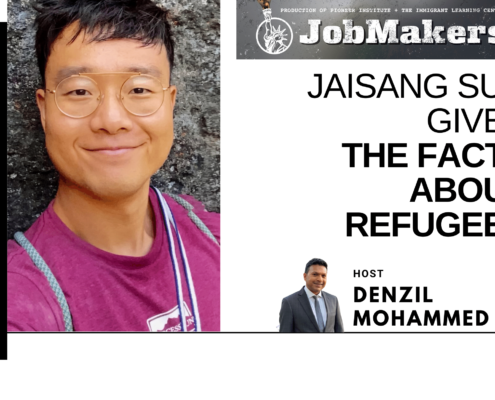
Jaisang Sun Gives the Facts About Refugees
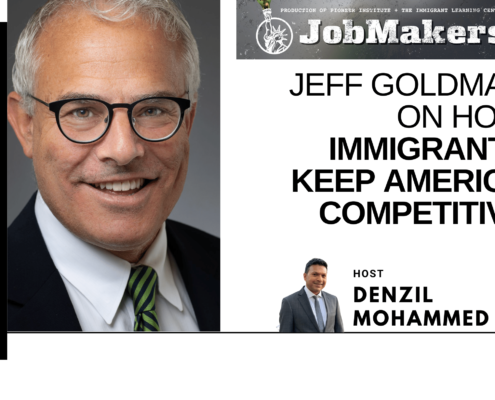
Jeff Goldman on How Immigrants Keep America Competitive

Trevor Mattos Shows How Massachusetts Runs on Immigrants
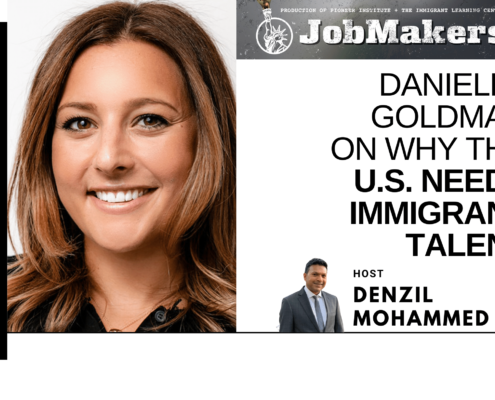
Danielle Goldman on Why the U.S. Needs Immigrant Talent
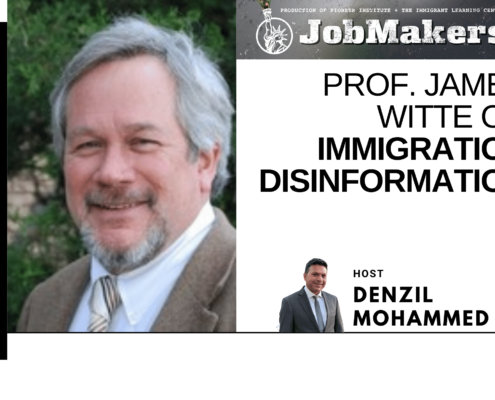
Prof. James Witte on Immigration Disinformation
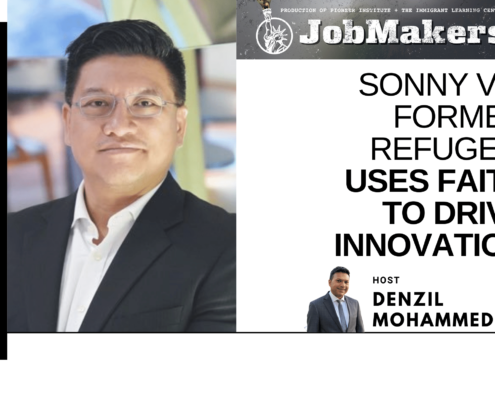
Sonny Vu, Former Refugee, Uses Faith to Drive Innovation
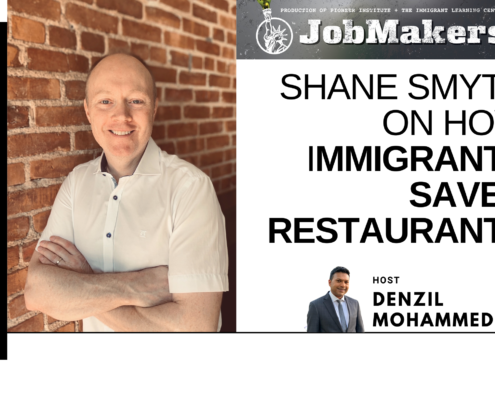
Shane Smyth on How Immigrants Saved Restaurants
